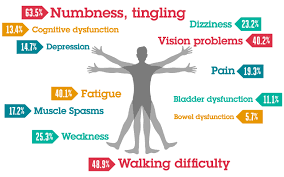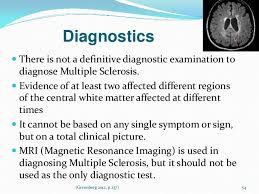

(continuation of MS Awareness)
Less common symptoms:
*Speech problems-this including slurring (dysarthria) and loss of volume (dysphonia) occur in approximately 25-40% of people with MS, particularly later in the disease course and during periods of extreme fatigue. Stuttering is occasionally reported as well.
*Swallowing problems — referred to as dysphagia — result from damage to the nerves controlling the many small muscles in the mouth and throat.
*Tremor, or uncontrollable shaking, can occur in various parts of the body because of damaged areas along the complex nerve pathways that are responsible for coordination of movements.
*Seizures — which are the result of abnormal electrical discharges in an injured or scarred area of the brain — have been estimated to occur in 2-5% people with MS, compared to the estimated 3% of the general population.
*Breathing Problems-Respiration problems occur in people whose chest muscles have been severely weakened by damage to the nerves that control those muscles.
*Itching-Pruritis (itching) is one of the family of abnormal sensations — such as “pins and needles” and burning, stabbing or tearing pains — which may be experienced by people with MS.
*Headaches-Although headache is not a common symptom of MS, some reports suggest that people with MS have an increased incidence of certain types of headache.
*Hearing Loss-About 6% of people who have MS complain of impaired hearing. In very rare cases, hearing loss has been reported as the first symptom of the disease.
Secondary and tertiary symptoms
While the primary symptoms described on this page (more and less common) are the direct result of damage to the myelin and nerve fibers in the central nervous system (CNS), the secondary symptoms are the complications that can arise as a result of these primary symptoms. For example:
- Bladder dysfunction can cause repeated urinary tract infections.
- Inactivity can result in loss of muscle tone and disuse weakness (not related to demyelination), poor postural alignment and trunk control, decreased bone density (and resulting increased risk of fracture), and shallow, inefficient breathing
- Immobility can lead to pressure sores.
While secondary symptoms can be treated, the optimal goal is to avoid them by treating the primary symptoms.
Tertiary symptoms are the “trickle down” effects of the disease on your life. These symptoms include social, vocational and psychological complications. For example, if you are no longer able to drive or walk, you may not be able to hold down your usual job. The stress and strain of dealing with MS often alters social networks and sometimes fractures relationships. Problems with bladder control, tremor or swallowing may cause people to withdraw from social interactions and become isolated.
Depression is very common in people with MS. Depression may be both a primary and a tertiary symptom as it can be caused by the disease process itself and/or triggered by the challenges discussed above.
Treatments for Multiple Sclerosis:
Multiple sclerosis is a neurologic disease that affects women more often than men. Onset is most commonly in the 20s or 30s.
MS is an autoimmune disease in which there is initially focal inflammation and then permanent damage to nerves of the central nervous system. The damage is really removal of the insulating material surrounding nerves. The tissue that insulates nerves is called myelin, and the damage is referred to as demyelination.
As a nerve that controls sensation or movement of a part of the body loses some of its myelin covering, the nerve may become dysfunctional. This can manifest itself as loss of that nerves function which can be sensation, vision, movement or coordination of movement. Affected sensory nerves can also cause pain.
There have been tremendous advances in our ability to diagnose and assess MS with the development of magnetic resonance imaging. Unfortunately, our understanding of the cause of this disease remains limited, as does our ability to treat it. There is some limited success in stopping or decreasing the severity of an MS attack. We would also like to stimulate a regrowth of the damaged myelin over the nerve. Unfortunately, this is not possible at this time.
There are several types of MS. Some patients have disease that will have an acute exacerbation followed by a prolonged quiet period, which can last years or decades. This form of disease is referred to as relapsed remitting MS, or RRMS. Others have a disease that gets progressively worse over time. There are two types of progressive disease. In primary progressive MS, or PPMS, symptoms steadily worsen over time from the very beginning. Secondary progressive MS, known as SPMS, begins as relapsed remitting disease and becomes progressive over time.
For an acute exacerbation of multiple sclerosis that can result in neurologic symptoms and increased disability or impairments in vision, strength or coordination, the preferred initial treatment is usually a type of steroid called a glucocorticoid. Patients who do not have a good response to steroidal therapy are often treated with plasma exchange. Plasma exchange is an extreme therapy that removes antibodies to myelin from the blood.
Patients with RRMS are often treated with immune-modulating drugs such as interferon or glatiramer acetate. Glatiramer is an exciting drug. It is a series of small proteins that are similar to myelin protein. It is thought to prompt the immune system to avoid attacking myelin.
Available treatments of primary and secondary progressive MS are of limited efficacy and have significant side effects. An additional fact to consider is that most trials have not lasted longer than two or three years and give only hints about long-term results of treatment.
In brief, no clinical trial has shown convincing evidence of benefit in the treatment of primary progressive MS. All suggested treatments for PPMS are empiric. Several drugs that are more commonly used in the treatment of malignancy, cladribine and mitozantrone, appear to have some activity.
In contrast, there is definite modest benefit in some treatments for secondary progressive MS. These treatments include various regimens of steroid therapy and the use of some drugs that modulate the immune system. Many of these drugs are more commonly used in treatment of cancer and rheumatoid arthritis such as cyclophosphamide, methotrexate and interferon.
MS should be treated by a neurologist with experience in managing it.

